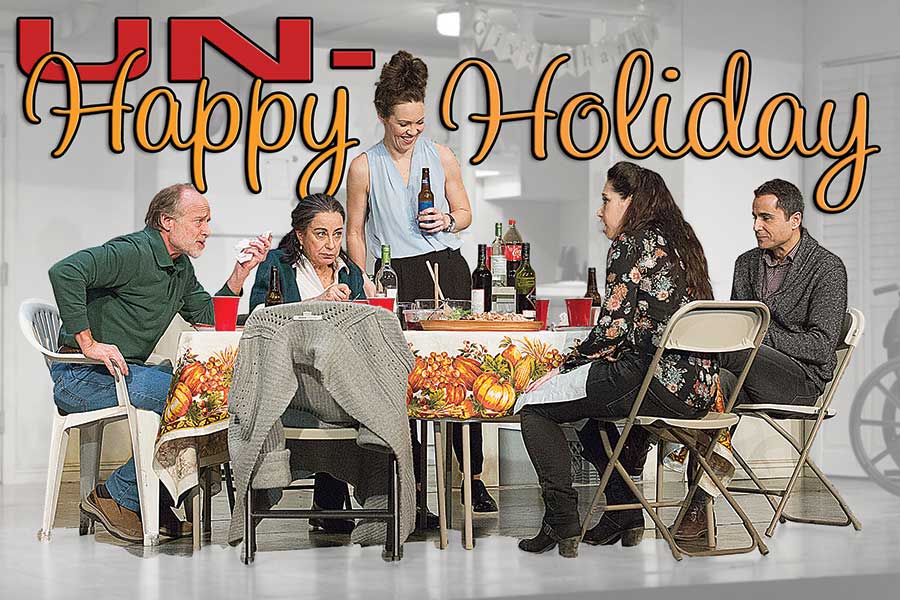If you need something to bring out the euphoric high of the Eagles winning the Super Bowl, you can take in an emotionally fraught family Thanksgiving with Stephen Karam’s Tony Award-winning play “The Humans,” at the Walnut Street Theatre through March 4.
“The Humans” first debuted in 2014 in Chicago, opened off-Broadway in 2015 and moved to Broadway in 2016. The play went on to win multiple accolades, including the Drama Desk Award, the Drama League Award and the Tony Award for Best Play.
The darkly comic drama unfolds in real time on a single set as the Blake family travels from Pennsylvania to celebrate Thanksgiving with the daughter, Brigid, at her crumbling duplex in Lower Manhattan. It is here where financial problems, health issues, aging and family tensions come to a boiling point and threaten to derail the occasion.
Jennie Eisenhower plays Aimee, Brigid’s openly gay sister, who is trying to keep the peace while dealing with her own personal abyss of problems. Eisenhower said “The Humans,” while entertaining, isn’t intended to be theatrical escapism.
“I think this is a pretty challenging piece for Walnut audiences,” she said. “I think it was an interesting and important addition to the seasons. It doesn’t offer escapism. It’s definitely a real slice-of-life piece. It’s very, very relevant and deals with a lot of the issues that are plaguing American culture and I think it can be hard and challenging for some audiences to see the mirror held up to themselves. But I think it’s very important and I think there are people who are moved by it and respond well to it. It’s an important piece for people to see.”
Eisenhower added there are many heart-warming and funny moments woven throughout the story to occasionally brighten the mood.
“If there wasn’t any humor, we’d all combust,” she said. “It’s actually a very funny play and it also explores a lot of topics that are really hard. I think without the humor, it definitely wouldn’t have the appeal that it winds up having. I think it’s very true to how a modern American family relates. We all have things that are going on with ourselves but we all use humor and lightness to buoy ourselves out of that. That’s what the show does. And my character in particular is the family clown and tries to lighten the mood when things are tough.”
Eisenhower said she was drawn to the character of Aimee because, despite the chaos going on in her life, she strives to be the peacemaker for this holiday gathering.
“I love Aimee,” she said. “She’s going through a lot of different things in her life. Every element in her life besides her family is falling apart. She’s lost her partner. She’s very sick and she’s also lost her job. Those three things combined would have a weaker person on the floor in a pile. But she’s cracking jokes and soothing her family members and really participating in the evening in this amazing way. I just love people who use humor or are able to see the light side of things. I really relate to that. That’s the way that I deal with stuff. She’s a really special character.”
Another aspect of Aimee’s story that Eisenhower appreciated was that she doesn’t fall into the expected dramatic turns of the lesbian character spending the holidays with her somewhat-dysfunctional family.
“Yes, Aimee is a lesbian and that is brought to light early in the piece, but it’s not really a factor in how they relate to her,” she said. “There’s no arguing about her being gay. There are no negative comments about it. The mother, in her own way, is trying to be supportive and sympathetic to the fact that she’s broken up with her partner. You really see Aimee as this whole person who happens to be a lesbian. That’s a very appealing thing about the role. She’s not playing any stereotype and the focus of her journey isn’t on her sexuality. That’s just a piece of her.
“Aimee is the older sibling and she’s more of the perfectionist and the achiever. She’s the lawyer and she’s played things by the rules. Brigid is this composer and a little bit more of the millennial sort of trope pursuing a particular lifestyle. She’s more at odds with her parents about cultural things and attitudes. She has more tension with the parents throughout the evening. Aimee’s parents are religious and Catholic and Aimee doesn’t at all identify that way, so there’s some tension there. But overall, I think she’s the shining star of the family in terms of her achievement.”
Like a lot of family gatherings, “The Humans” doesn’t necessarily leave things on a warm and fuzzy or a resolute note, which is something Eisenhower said is part of the play’s appeal. She added it will certainly leave audiences with something to talk or think about long after the curtain drops.
“The ending of this play is a controversial part of it and one of the things that is the most difficult for the audience,” she said. “It’s not your standard comedy where there’s a nice resolution. There’s an ambiguity to the end of the piece and it leaves people sometimes confused and sort of bewildered, and that is part of the intent of the piece. People won’t leave feeling a resolution about who these people are but, they will leave talking and arguing about it. It really is a thought-provoking piece in that way.
“It’s so amazing when I’m leaving the theater and I hear people in the elevator arguing over whether the Blake family will be OK financially and relating to their own family stuff. It’s an amazing piece. It’s called ‘The Humans’ because of its universality and how much it taps into our modern humanity.”
Walnut Street Theatre presents “The Humans” through March 4 on its Mainstage. For more information or tickets, call 215-574-3550 or visit www.walnutstreettheatre.org.

